8. Detour (Edgar Ulmer, 1945)
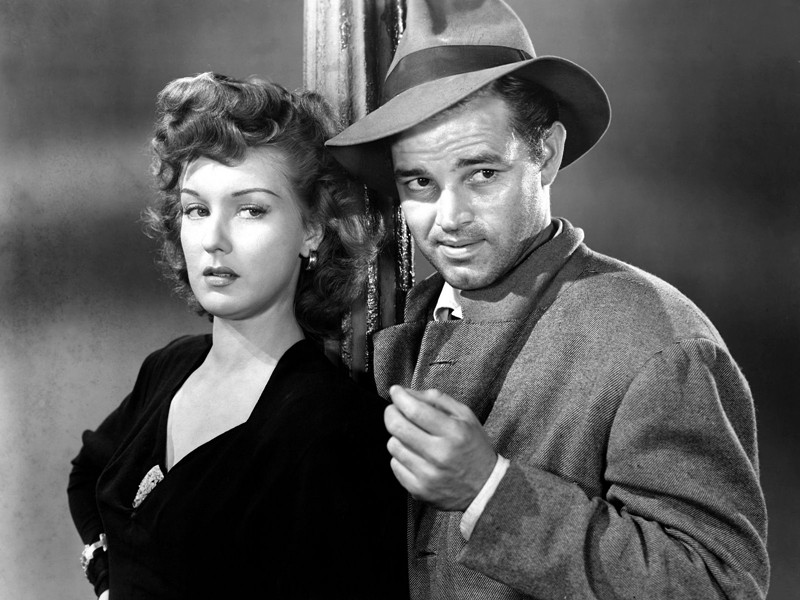
At 67 minutes, Detour moves at a breakneck pace. When sad sack piano player Al (Tom Neal) heads west to reunite with his girlfriend he runs into a world of trouble. When Al’s driver dies in a freak accident a series of unfortunate events descend upon him for no particular reason at all.
One of the early film noirs, Detour also introduced one of the most memorable femme fatales ever with Vera (Ann Savage). The film pops when she enters at the halfway point. Her unforgettable exit adds to the distinct flavor of Detour.
Ulmer’s economical direction creates a tense atmosphere. The sense of America as a place of wide open spaces, shifting identities, quick companions, highways, diners, hotels, and darkness glide through the shadowy corridors of a remarkable film.
7. Punishment Park (Peter Watkins, 1971)
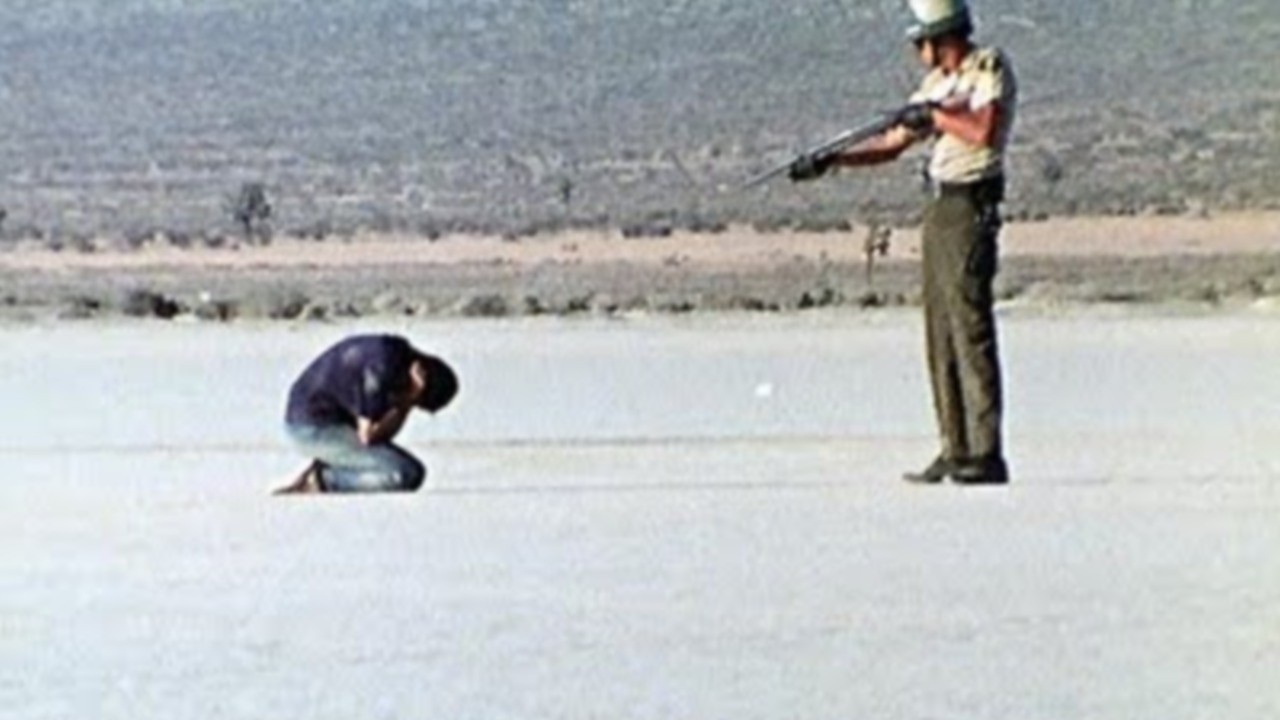
Punishment Park imagines America as a brutal Fascist regime. Shot as a fictional documentary, few films have better depicted the agony of a democracy coming apart. Set during the Vietnam War, the film dramatizes a brutal crackdown on all dissidents. The accused stand before tribunals and are given the choice to serve their sentence or take a chance on Punishment Park: a brutal 50 mile obstacle course that means certain death.
Watkins inter cut between two narratives, one of the tribunal and one of the actual chase through Punishment Park. The tribunal scenes portray protestors engaged in didactic arguments with members of the board. Neither side listens to the other, they stick to their talking points and never compromise.
The experience of watching Punishment Park will make anyone feel the boot of the system stomping on their throat. Many viewed the film as “communist” propaganda, but they missed the point. If nobody listens to each other a “free” society will implode. Unforgettable in every way.
6. Birdman (Alejandro Gonzalez Inarritu, 2014)
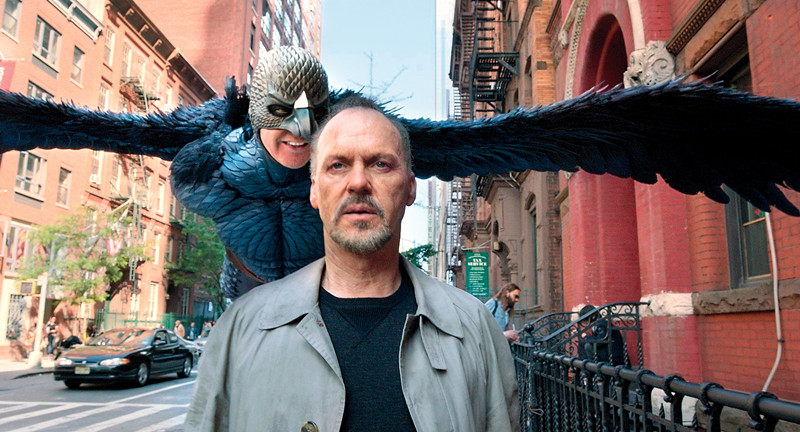
Birdman’s a landmark film on 21st Century America. Michael Keaton plays Riggan, an aging movie star trying to redeem his career on the stage after gaining fame by playing a superhero. Riggan’s play is an adaptation of the Raymond Carver story “What We Talk About When We Talk About Love.”
Innaritu weaves a compelling tapestry of mediums in collision: a movie about the production of a play based on a short story.
The use of long tracking shots make for an exhilarating viewing experience as the camera follows Riggan’s in his creative exultations. Ed Norton co-stars as stereotypical and egotistical actor. Emma Stone shines as Riggan’s jaded daughter.
Social media looms as an ominous presence throughout Birdman, yet the human moments refute the shallow world of tweets and status updates. On another level, Birdman is a compelling representation of the creative process. And finally Birdman is an argument for a new vibrant cinema to challenge, provoke, and entertain in an age of superhero movies and vapid tweets.
5. Double Indemnity (Billy Wilder, 1944)
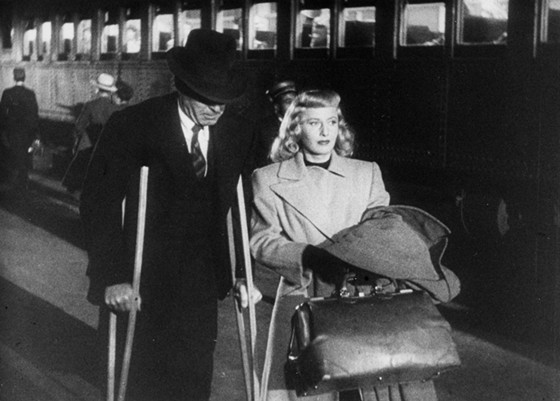
What sort of evil are those well dressed people who live in nice homes capable of doing? To quote the story’s protagonist Walter Neff (Fred MacMurray), “How can murder smell like honeysuckle?” Billy Wilder’s masterful sense of characterization and setting make Double Indemnity an essential American crime story.
Walter Neff is a shifty insurance salesman who falls into the seductive web of femme fatale Mrs. Diderickson (Barbara Stanwyck). MacMurray’s edgy narration into a Dictaphone create a nail biting tension. Edward G. Robinson does solid supporting work as a shrewd insurance investigator.
Wilder anticipated the milieu of post-war America: a land of drive in hamburgers, bowling alleys, and supermarkets. Beneath the plastic artistry of consumerism lies a big empty. Ambition and lust took Walter down a dark path, into a cruel world where justice arrives like death itself: fast and uncompromising.
4. Dogville (Lars von Trier, 2003)
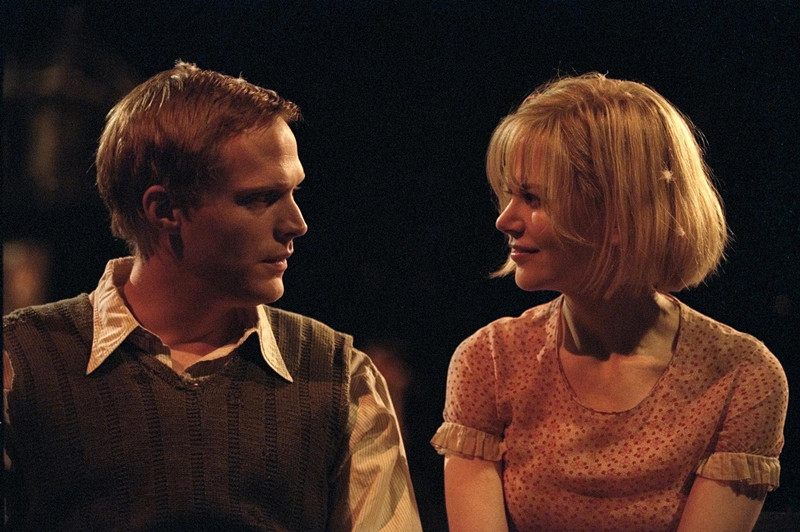
A brilliant satire, Dogville is a harsh parody of Thornton Wilder’s Our Town. Danish director Lars Von Trier slowly chips away at the artifice of small town America.
An all star cast led by Nicole Kidman create a compelling and claustrophobic atmosphere. Von Trier’s gliding video camera presents a drab Americana.
Nicole Kidman stars as a beautiful young woman with a mysterious past who stumbles into an isolated Colorado town. The town’s intellectual “Thomas Edison” (Paul Bettany) longs to be a great writer and pines for her. Other townsfolk treat her with a polite deference and agree to accept her as part of their community on certain conditions. As relationships evolve the behavior of the town gets increasingly disturbing.
Each character’s an archetype of American literature, as if characters from Hawthorne, Twain, and Sherwood Anderson walked into a story to reveal the ugliness beneath their personas. Everything leads to a shattering and perversely satisfying denouement.
3. Once Upon A Time In America (Sergio Leone, 1984)
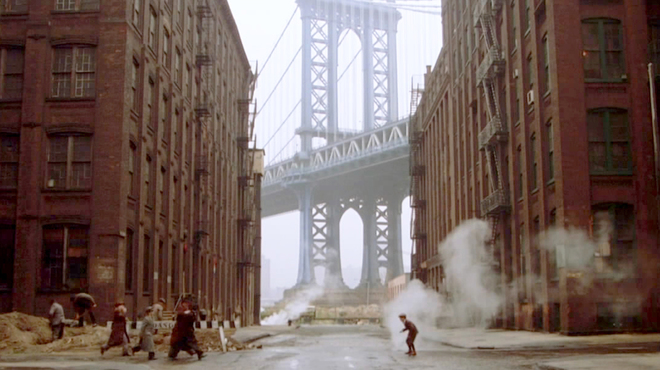
A project years in the making, Sergio Leone’s four and a half hour epic sketches the rise and fall of Jewish gangsters in New York City.
Leone’s imagines America as a dreamy landscape of passion and crime. The structure may be the most definitive characteristic of Once Upon A Time In America, with shifts back and forth through time. Some interpreted the film as a literal pipe dream since it begins inside an opium den.
Noodles (Robert De Niro) and Max (James Woods) are childhood friends who escaped their humble origins and formed their own gang. To survive they had no choice but to fight and defend their turf.
The most striking feature of the is the historical recreation of early 20th century New York as young Noodles and Max make their way in the world. Violence looms around every corner with small moments of beauty and transcendence.
Loyalty and tribal ties test them as they mature into adulthood. Violence plays a role in every aspect of their lives. Leone never romanticizes the violence either, it’s fast and grueling.
One of the most intense interpretations of the American experience ever made, a movie full of mystery and high emotion.
2. Paris, Texas (1984, Wim Wenders)
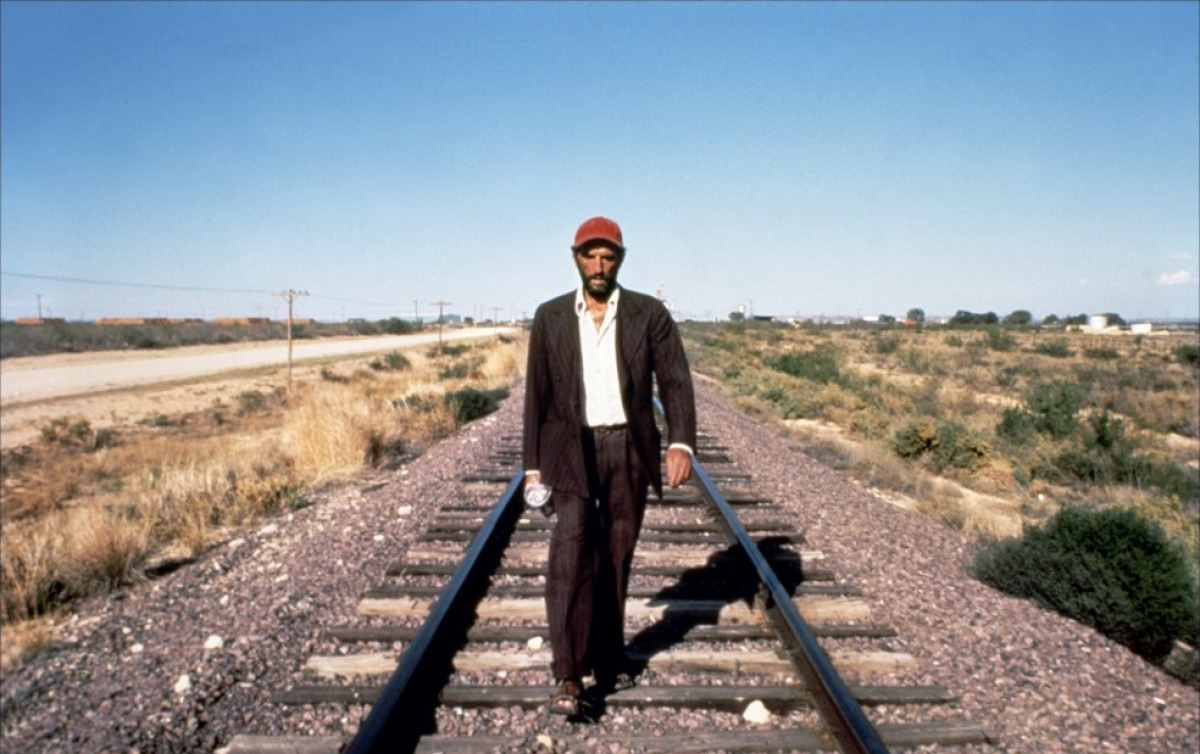
Wim Wenders crafted a piece of cinematic poetry with Paris, Texas. The tale follows Travis (Harry Dean Stanton) in his journey from a blank slate to redeemed father/husband in a story that is both epic and intimate. The wide vistas of the American landscape are beautiful, dissonant, colorful.
The film begins with a lone man wandering the desert. His kindly brother Walt (Dean Stockwell) finds him and offers him a temporary home. Walt and his wife Ann (Aurore Clement) are raising Travis’s son Hunter. Eventually, Travis and Hunter bond. When they go off in search of the mysterious woman who links them literally and metaphorically the film morphs into a post-modern Quixotic quest through gas stations and crooked highways.
What does it mean to be a family? A husband? A brother? A son? A mother? A wife? All these questions are raised. Like Antonioni and Ulmer, Wenders showcases the vastness of America, a place of endless roads and perpetual renewal. Emotion and memory overcome a vast distance.
1. Chinatown (1974, Roman Polanski)
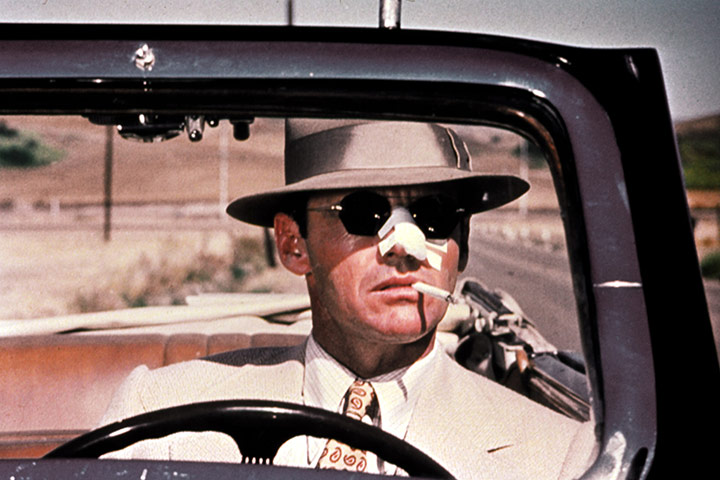
With Chinatown, Roman Polanski pushed the boundaries of the film noir and the detective genres upward to another level. It’s 1930s Los Angeles and Jack Nicholson is Jake Gittes, a hot head private eye who gets lost in a labyrinth of intrigue surrounding water politics. Methodically paced with each scene building upon the other, Chinatown becomes a study on the banality of evil. A trip into the dusty attic of American history.
Polanski captured the period well, showcasing an eye for detail and flawless camera movement. Polanski’s sensibility blended perfectly with Nicholson’s powerful personality and Robert Towne’s tightly written script. Faye Dunaway’s performance brings a strength and vulnerability to the tired femme fatale trope. John Huston personifies evil with his role.
Issues of race, class, gender, and history are handled with intelligence and wit, a multi-level narrative of the personal and the political. No line of dialogue nor any camera shot is wasted, a flawless film that owes much to Polanski’s steady direction.
Author Bio: Eric teaches English Composition and resides in Dayton, Ohio. A lifelong movie fan, his favorite filmmakers include Steven Spielberg, Martin Scorsese, Akira Kurosawa, Stanley Kubrick, and Quentin Tarantino. In his spare he listens to Bob Dylan, reads history and fiction, and often blogs about those subjects.